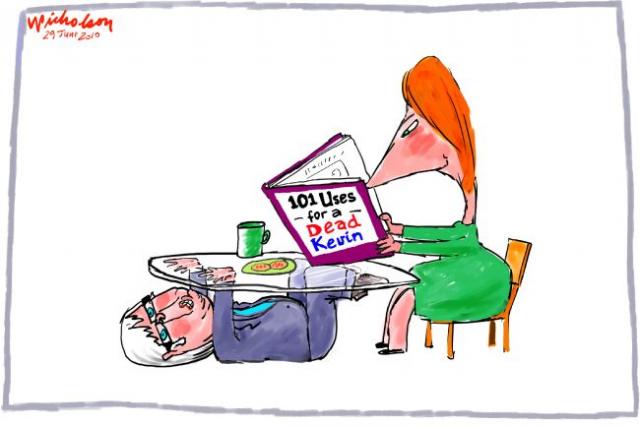Search
Democracy Links
Member's Off-site Blogs
a modern mata hari .....

On taking office in 2007, Labor had the political savvy to get controversial decisions made quickly, while its reputation was still unsullied and before resolve could crumble under Canberra's lobbying system. And at the UN, it seized an early opportunity to signal that foreign policy was under new management, supporting a resolution calling on Israel to stop establishing settlements in the Palestinian territories and a resolution calling for the Geneva Conventions to apply there.
These basic tenets of international law and humanitarian law are accepted, notionally, by the entire international community, but a vote is held annually at the General Assembly (GA), if only to isolate and attempt to embarrass those countries sufficiently brazen to make what is, in effect, a public declaration that Israel should be exempt. In 2003, Australia joined the "hard core" of those voting against this declaration: Israel itself, the United States and four Pacific micro-states whose votes have essentially been bought - the US Marshall Islands, Nauru, Palau and Micronesia.
Under Rudd, Australian officials told the UN in 2008 that the Government had changed its position because it supported a two-state resolution of the conflict to deliver a secure Israel living beside a viable Palestinian state and that Australia believed both sides should abide by their obligations under the Road Map for Peace. Australia said it was concerned that continued settlement-building activity would undermine confidence in the negotiations.
Ominously - in light of the sequence of events that was to follow - the president of the Executive Council of Australian Jewry, Robert Goot, was quoted in the Fairfax media as being "concerned" over the switch. "We are concerned that the vote has changed, we do not understand the basis for the change", he said.
All in all, then, these were optimistic days, for those wishing for a more even-handed line from Australia on this litmus-test issue of international affairs. And the steady accretion of infinitesimal gradations seemed to be in line with public opinion. A poll by Roy Morgan research, conducted for the pressure group, the Coalition for Justice and Peace in Palestine, found that Australians felt more sympathy for the Palestinians, and expressed more support for their position, over the attack on Gaza, than for the Israelis or their position.
But for those opposed to such developments, an alternative strategy was taking shape. At the time of "Cast Lead", Australia's response was given, not by Rudd himself - who was taking a short break between Christmas and New Year - but by Gillard, standing in for him. She characterised the onslaught as no more than Israel exercising its "right to defend itself".
Weeks later, she became the first world leader since the attack to make an official visit to Israel, at the head of a bipartisan political and business deputation (accompanied by former Treasurer Peter Costello for the Opposition) - to fulsome thanks from her hosts for having been "almost alone in sticking by us". A study of the transcripts of her speeches and press conferences reveals that the word, Gaza, never once passed her lips.
And we now know - thanks to Wikileaks - that at the same time in Canberra, another key figure on the Labor Right, NSW Senator Mark Arbib, was briefing his handlers at the US embassy on Rudd's travails, and the credentials of his deputy to take over. Leaked cables reveal Arbib to be a longstanding American intelligence asset. And at some point in this period, the wish became father to the deed: Arbib was not merely discussing the possibility of Rudd's ouster, but playing a leading role in organising it. By the time Labor's leadership spill brought the underlying tensions into the open, Rudd's fate was already sealed by the numbers Arbib had stacked up behind the scenes.
Under Gillard, Australia has reverted to its previous form. At the UN vote last November, we were back with the not-so-magnificent seven, voting against a resolution which "reaffirmed the illegality of Israeli actions intended to change the status of Jerusalem ... Reaffirming its commitment to the two-State solution of Israel and Palestine living side by side in peace and security within recognised borders, the Assembly also stressed the need for Israel to withdraw from Palestinian territory occupied since 1967, including East Jerusalem".
- By John Richardson at 10 Feb 2011 - 12:05pm
- John Richardson's blog
- Login or register to post comments
Recent comments
3 hours 49 min ago
9 hours 5 min ago
9 hours 7 min ago
11 hours 16 min ago
11 hours 47 min ago
1 day 7 hours ago
1 day 9 hours ago
1 day 9 hours ago
1 day 10 hours ago
1 day 11 hours ago